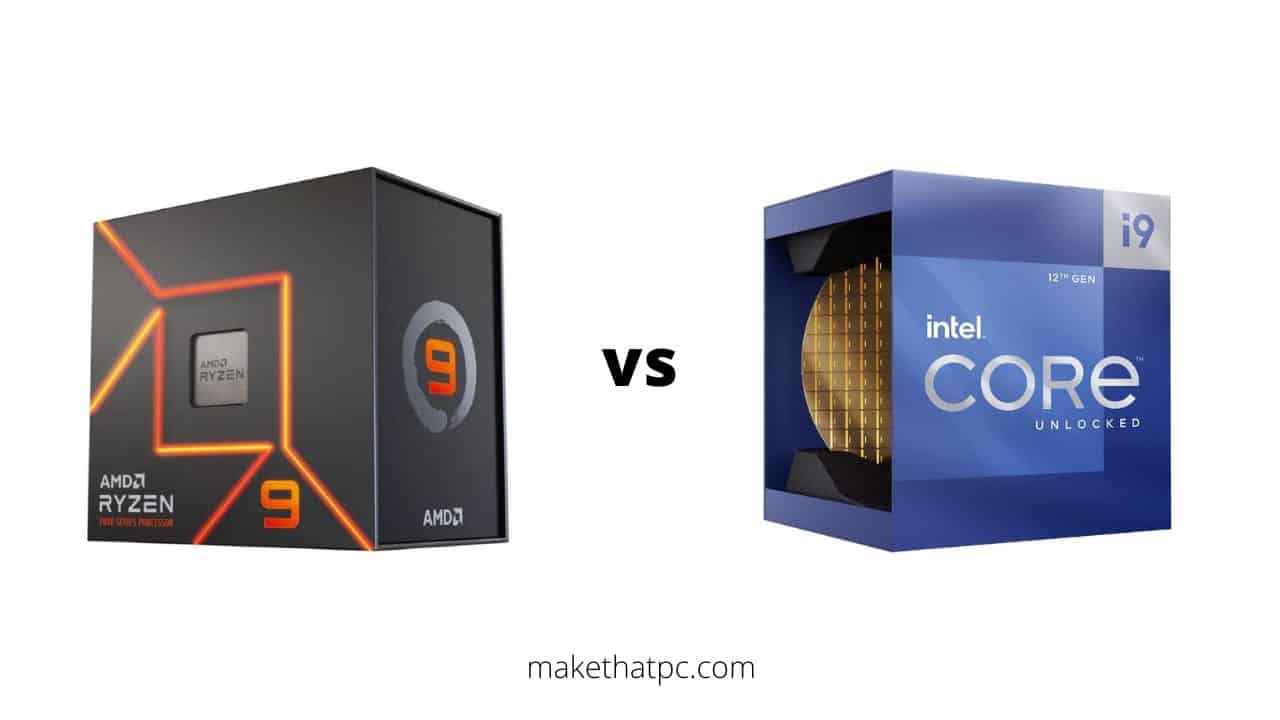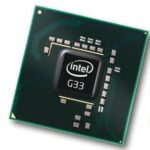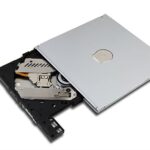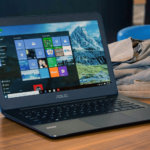The AMD Ryzen 9 7950X and the Intel Core i9-12900K are two high-end processors that are popular among enthusiasts and gamers. Both processors offer excellent performance and are built using advanced manufacturing processes, but there are some differences between them.
The 7950X is a part of the AMD Ryzen 9 series and is built using the 5nm TSMC N5 process. It has 16 cores and 32 threads, with a base clock speed of 4.5GHz and a boost clock speed of up to 5.7GHz. It has a TDP of 170W and supports DDR5 memory with ECC support.
The 12900K, on the other hand, is a part of the 12th generation Intel Core i9 series, also known as the Alder Lake series, and is built using the Intel 7 process. It has 16 cores, with 8 performance cores and 8 efficient cores, and 24 threads. It has a base frequency of 3.2GHz for the performance cores and 2.4GHz for the efficient cores, with a max turbo frequency of up to 5.2GHz. It has a base power of 125W and a maximum turbo power of 241W and supports DDR5 or DDR4 memory.
In this article, we will compare the 7950X and the 12900K in terms of their specifications, performance, and power efficiency.
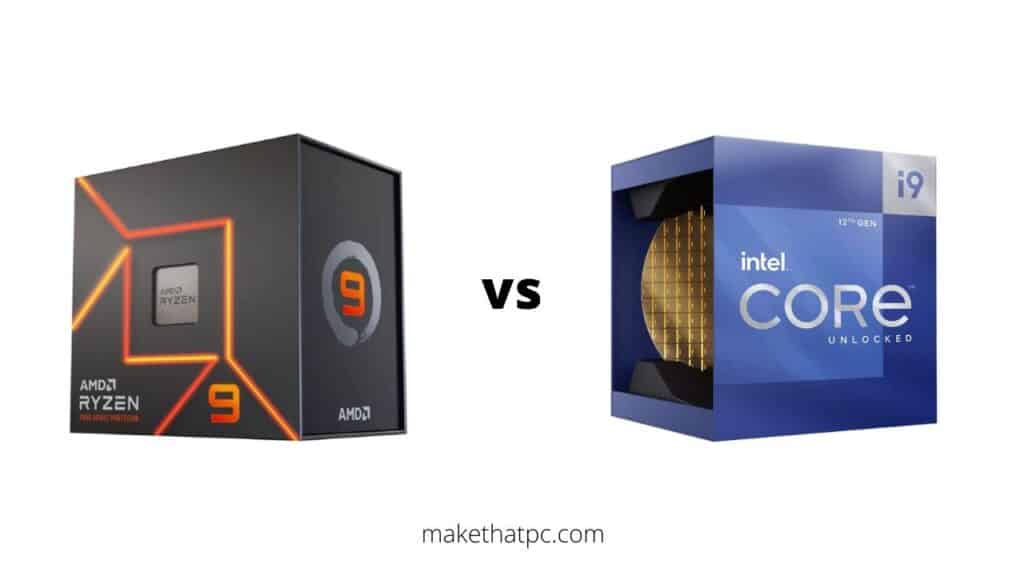
Theoretical Specifications (Comparison)
| Specification | AMD Ryzen 9 7950X | Intel Core i9 12900K |
| CPU Generation | 3rd Generation | 12th Generation |
| Cores/Threads | 16/32 | 16/24 |
| Base Clock/Boost Clock | 4.5/5.7 GHz | 3.20/5.20 GHz |
| Cache (L1/L2/L3) | 1KB/16KB/64MB | 30MB/14MB/- |
| Overclocking | Available | Available |
| PCle Version | 5.0 | PCle 5.0 and 4.0 |
| Memory Support | 1x1R– 5200 MT/s 1x2R– 5200 MT/s 2x1R– 3600 MT/s 2x2R– 3600 MT/s | Up to DDR5 4800 MHz to DDR4 3200 MHz |
| Cooling Solution | Not Available | Not inbuilt |
| Integrated Graphics Card | Yes | Intel® UHD Graphics 770 |
The main advantage of the 12900K is that it supports DDR4 memory. Also, it has got integrated graphics.
Synthetic Benchmark Scores (Comparison)
| Parameter | AMD Ryzen 9 7950X | Intel Core i9 12900K |
|---|---|---|
| CPU Mark Score | 64,295 | 41,473 |
| Single-Core Score (Geekbench) | 2,217 | 1,990 |
| Multi-Core Score (GeekBench) | 24,396 | 17,333 |
| Single-Thread Rating (PassMark) | 4,336 | 4,209 |
Cinebench R23 Scores Comparison
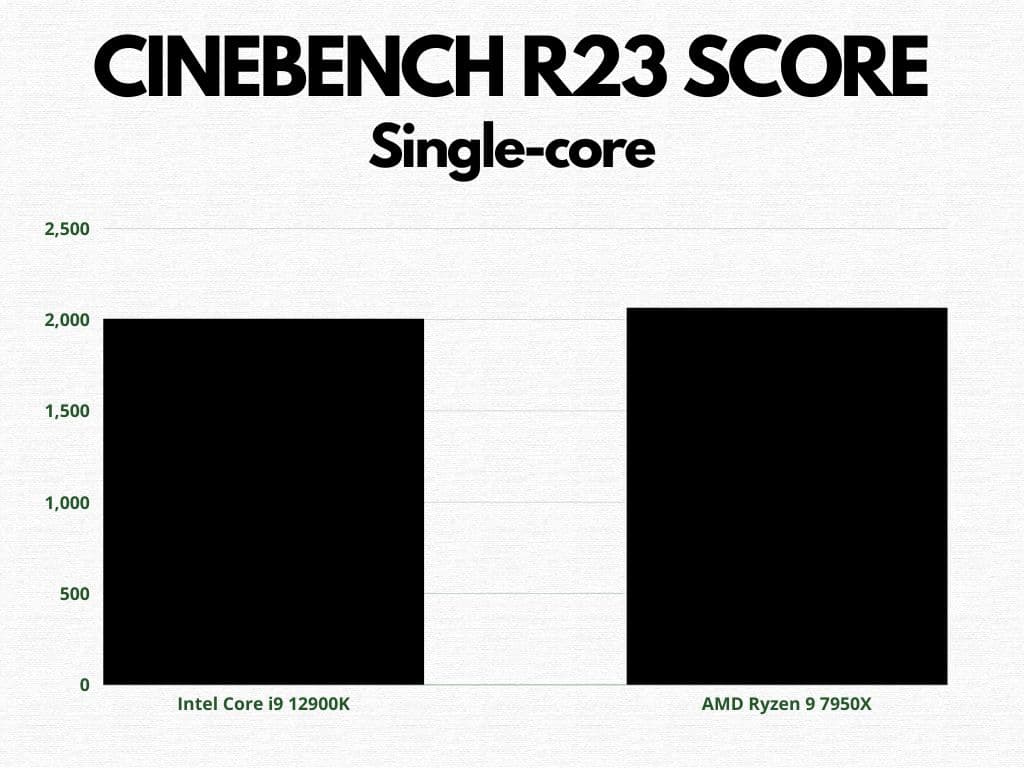
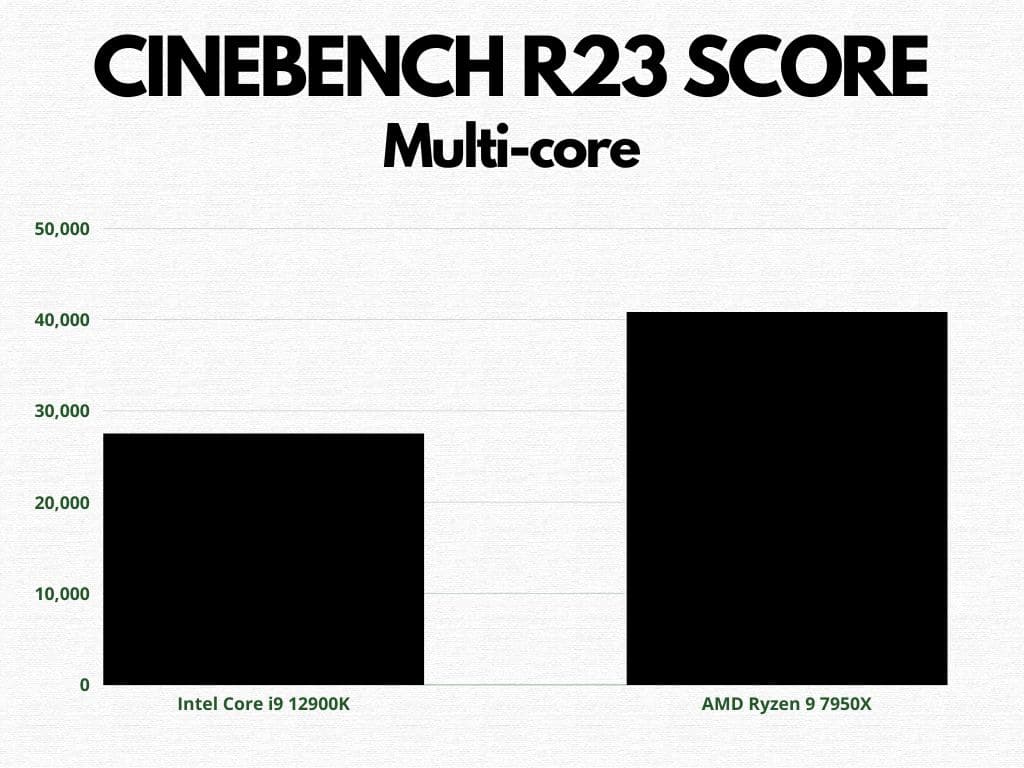
Power Consumption and Effeciency
The AMD Ryzen 9 7950X has a TDP (thermal design power) of 170 W, while the Intel Core i9-12900K has a TDP of 125 W. This means that the 7950X will generally consume more power and generate more heat than the 12900K. As a result, the 7950X may be less energy efficient than the 12900K in some workloads. However, it’s worth noting that the actual power consumption and energy efficiency of a processor can vary depending on the specific workload and other factors such as the motherboard and cooling solution used.
In general, processors with higher TDPs will tend to be less energy efficient than those with lower TDPs, but this is not always the case. It’s also worth noting that the energy efficiency of a processor is not the only factor to consider when evaluating its overall performance and value. The overall performance of a processor, as well as its price, features, and other factors, should also be taken into account when making a purchasing decision.
Which one is best for gaming? 7950X vs 12900K
In general, the AMD Ryzen 9 7950X and the Intel Core i9-12900K should both be able to handle most games at high frame rates and resolutions. The 7950X has a base clock speed of 4.5 GHz and a boost speed of 5.7 GHz, while the 12900K has a base clock speed of 3.7 GHz and a boost speed of 5.3 GHz. The 12900K may have a slight advantage in some games due to its higher clock speeds and lower TDP, which can help reduce power consumption and heat generation.
However, the 7950X may be a better option for those who need a processor with strong multi-threaded performance for tasks such as streaming or content creation, in addition to gaming. It has 16 cores and 32 threads, making it well-suited for tasks that can benefit from high core and thread counts.
In the gaming benchmark tests which you can see below, the performance of both CPUs is exactly the same. They both are creating similar kinds of bottlenecks and offer exact same FPS. You can see for yourself.
So, if your goal is pure gaming, just save your budget by going for the 12900K. 7950X is going to be overkill even for 1080P gaming at Ultra resolutions. You can then invest your saved money on Graphics Card or RAM.
Which one is best for productivity?
AMD Ryzen 9 7950X may be a better option for productivity tasks compared to the Intel Core i9-12900K. The 7950X has 16 cores and 32 threads, making it well-suited for tasks that can benefit from high core and thread counts such as rendering, media encoding, and scientific simulations. It also has improved instruction-per-clock performance and AVX-512 support, which can help improve the performance of certain types of workloads.
On the other hand, the Intel Core i9-12900K is a high-end processor with 8 cores and 16 threads. It has a base clock speed of 3.7 GHz and a boost speed of 5.3 GHz. While it is generally faster than the 7950X in single-threaded applications, it may not be as well-suited for tasks that can benefit from high core and thread counts.
Ultimately, the choice between the 7950X and the 12900K for productivity tasks will depend on the specific workload and the user’s needs and budget. But, again, the 7950X will be a better option for those who need a processor with strong multi-threaded performance and are willing to pay a premium price for it. On the other hand, the 12900K may be a better option for those who need good single-threaded performance and are willing to pay a premium price for it.
Cache Difference
The AMD Ryzen 9 7950X has a total of 32 MB of L3 cache, which is shared between its 16 cores. This translates to 2 MB of L3 cache per core.
The Intel Core i9-12900K has a total of 16 MB of L3 cache, which is shared between its 8 cores. This translates to 2 MB of L3 cache per core, the same as the 7950X.
In general, a processor’s cache is used to store frequently used data and instructions, which can help improve the performance of the processor by reducing the need to access main memory. A larger cache size can potentially improve the performance of a processor, especially in tasks that make heavy use of the cache. However, the specific impact of cache size on performance can vary depending on the workload and other factors.
In summary, the AMD Ryzen 9 7950X and the Intel Core i9-12900K have the same amount of L3 cache per core, with the 7950X having a total of 32 MB of L3 cache and the 12900K having a total of 16 MB of L3 cache.
Memory Difference
The Intel Core i9-12900K has a maximum memory size of 128 GB and is compatible with both DDR5 and DDR4 memory types. It has a maximum of 2 memory channels and a maximum memory bandwidth of 76.8 GB/s. ECC memory is supported. The 12900K can support memory speeds of up to DDR5-4800 and DDR4-3200. Please note that this information is not accurate, as the 12900K is only compatible with DDR4 memory and does not support DDR5 memory.
7950X is compatible with DDR5 memory and supports memory speeds of up to DDR5-5100. It has a maximum memory size of 128 GB and has 2 memory channels. The 7950X supports a maximum memory bandwidth of 95 GB/s. ECC memory is supported if mobo supports it.
What are the key differences?
- Cores and Threads: The 7950X has 16 cores and 32 threads, while the 12900K has 12 cores and 24 threads.
- Clock Speeds: The 7950X has a base clock speed of 4.5 GHz and a boost clock speed of 5.7 GHz, while the 12900K has a base clock speed of 3.7 GHz and a boost clock speed of 5.3 GHz.
- Price: The 7950X is generally more expensive than the 12900K.
- Performance: The 7950X and 12900K may perform differently depending on the specific workload and other system configurations. In general, the 7950X is better suited for heavily-threaded workloads, while the 12900K may offer better single-threaded performance.
Price Difference
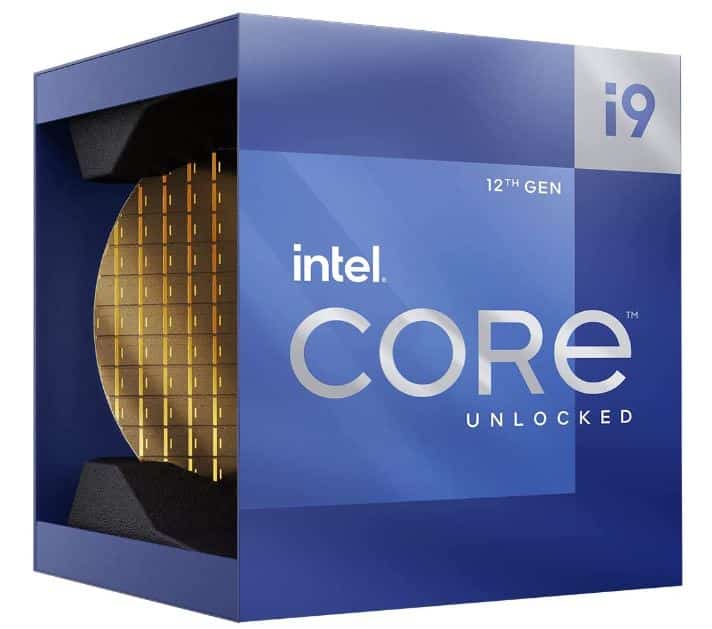
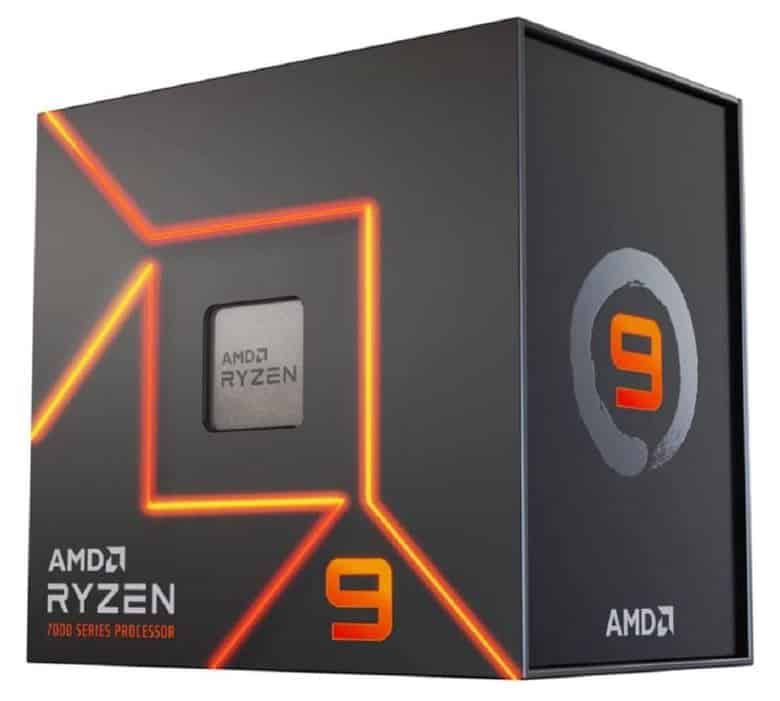
By the time I am writing this article, the 7950X is around 150$ expensive as compared to the 12900K. Surely, 7950X is coming with great specifications and higher performance. But, the performance difference is also pretty substantial. So, you are getting what you are paying for the 7950X. However, 12900K is still a good a good CPU for enthusiasts and gamers with above-average requirements.
Conclusion: Intel Core i9 12900K vs AMD Ryzen 9 7950X
When it comes to choosing a high-end processor, two of the top options on the market are the Intel Core i9-12900K and the AMD Ryzen 9 7950X. Both processors offer impressive performance, but there are some key differences to consider when deciding which one is the best fit for your needs.
One of the main advantages of the 12900K is its strong performance in gaming. It is currently considered the fastest gaming processor on the market, thanks to its high clock speeds and strong single-core performance. It also offers impressive application performance, with particularly strong gains in low-threaded applications. The 12900K has an unlocked multiplier, which allows for easy overclocking, and has improved energy efficiency compared to previous generations.
The 7950X, on the other hand, offers impressive performance improvements in all areas. It has particularly strong application performance when it is able to fully scale, thanks to its high core count and strong multi-core performance. It also has strong gaming performance and supports PCIe 5.0 for storage and graphics. It has integrated graphics, and existing coolers are compatible with its Socket AM5. The 7950X is multiplier unlocked and supports DDR5 memory. It is manufactured using a 5 & 6 nanometer TSMC process, and does not have the risk of E-Cores complicating software compatibility that some Intel CPUs do. It also supports AVX512 and AI instructions. However, the 7950X is very expensive and has a high platform cost.
Ultimately, the decision between the 12900K and the 7950X will come down to your specific needs and priorities. If gaming performance is your main concern, the 12900K is the better choice. However, if you need strong multi-core performance for applications and don’t mind paying a higher price, the 7950X may be the better fit.

I am Anshul Rana, an experienced author specializing in PC gear reviews and Windows 10 software tutorials. With a strong passion for technology and an in-depth understanding of the PC industry, I provide insightful and detailed analyses of computer peripherals, gaming gear, and software solutions. My writing style is concise yet informative, making complex topics accessible to both beginners and advanced users. Through my reviews and tutorials, I aim to offer valuable guidance, helping readers make informed decisions to enhance their PC experience and explore the vast possibilities of Windows 10 software.
